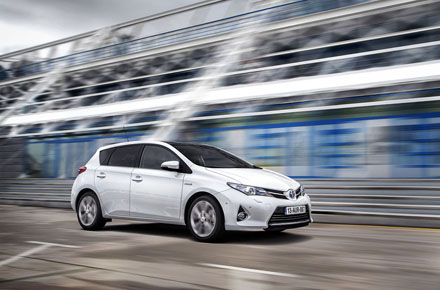
WITH the end of the tax year fast approaching, if you’re an SME running company cars it’s time to reconsider the way car choices line up for your small fleet.
With new company car tax rules coming into effect at the start of April, the cost of corporate motoring is set to rise. But by making a few head-led changes, you can kerb this cost over the coming years .
Company car tax rates will rise by 6% in just 4 years
From April 1, the threshold for the main rate of capital allowances for business cars reduces from 160g/km of CO2 to 130g/km. At the same time, the threshold for claiming 100% first year capital allowances falls from 110g/km to 95g/km. These changes will affect a huge number of company car drivers, who had their eyes set on what would previously be considered an extremely clean and efficient car.
Lowering the threshold to 95g/km does, however, make a compelling case for the introduction of hybrid vehicles to a company’s choice of cars. The current Toyota Auris Hybrid for example, emits just 91g/km of CO2. (Read our Auris Hybrid car review.)
Key changes
- Capital allowance thresholds are being reduced
- The company car tax escalator really starts to bite
- Watch for changes to the 3% diesel surcharge
Along with the lowering of the taxable threshold comes the introduction of the benefit-in-kind escalator, with a 1% increase this year, followed by an additional 1% rise in 2014-15. A further 2% will be applied in both 2015-16 and 2016-17 – equating to a total rise of 6% in just four years. (See the latest company car tax tables here.)
Fleet management and leasing specialist, Fleet Alliance, compared the cost of running a Toyota Auris Hybrid against a similarly specced Ford Focus 1.6 TDCi diesel, to see how the figures would vary over three years.
The Toyota not only cost less to tax as it didn’t attract the 3% diesel surcharge, but it also avoided the annual incremental tax-band increase that the Ford was subject to. The Auris cost a whopping £2269 less in company car tax alone.

Fleet Alliance MD, Martin Brown, said: “We believe hybrids have a growing role to play in near-term company car policy, at least while the 3% diesel supplement remains in place, providing drivers with conventionally sized company cars but minus the tax bill.”
Mr Brown also commented: “There are now over 2080 models in UK below the 120g/km mark, with 440 of those below 100g/km. Two years ago there were only 48 such models, while four years ago there were none, which shows the speed with which manufacturers are developing new models.”
With those sorts of changes happening, it is worth SMEs addressing their company car policy now to reduce their business car costs. With a few small changes, it appears, you can save money across the board on a daily basis.
“The tax position on company cars is becoming increasingly more aggressive for SME small fleets that stand still on company car policy. It is essential to embrace the latest in low-emission cars or the latest company car tax breaks to maintain best value from company cars.”
Mr Brown added that Fleet Alliance had produced a White Paper on the tax changes. It can be accessed here: White Papers.







